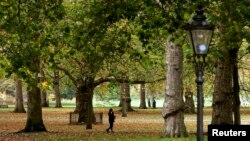Getting back to nature is good for your mental health, according to new research, giving advocates of urban parks another reason to promote the value of green space.
Nearly 80 percent of the population in middle- and high-income countries live in cities, where depression is a major public health concern. Parks, gardens and natural spaces are not always nearby.
Some studies have suggested that there is a relationship between green space and happiness, but researchers have not established a cause and effect link. So Mathew P. White and colleagues from the University of Exeter decided to try to pin it down.
They compared the mental health of hundreds of Britons who had moved from a grey city neighborhood to a greener one with those who had moved in the opposite direction.
Looking at the data over the course of five years, they found that people who had moved to a greener area were happier — and stayed happier — after their move.
In a report in the journal Environmental Science & Technology, the researchers conclude, "environmental policies to increase urban green space may have sustainable public health benefits."
Looking at the data over the course of five years, they found that people who had moved to a greener area were happier — and stayed happier — after their move.
In a report in the journal Environmental Science & Technology, the researchers conclude, "environmental policies to increase urban green space may have sustainable public health benefits."





